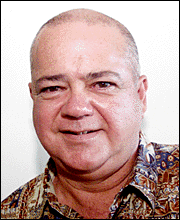


’Pen Pal
THE Major League Baseball world has been buzzing since Japan's Ichiro Suzuki came to play in the U.S. He and Tsuyoshi Shinjo are the first two position players from Japan to play in America. Ichiro’s success
no surpriseThe first Japanese pitcher to play here was Masanori Murakami of the San Francisco Giants in the mid-'60s, and several others have followed. But Ichiro is the first true superstar to arrive from Japan.
Baseball people have known for years that the Japanese players can play. But when does it all start for them? How have they progressed this far?
Take a trip to Japan to watch lower levels of baseball, and you'll find out.
In June of 1985, I took our Punahou team to Japan for 10 days. I was amazed at what I saw in Tokyo and in the countryside. But mainly I was in awe of the high school baseball played there. Here are some items of interest:
>> For a foreign high school team to play in Japan, it's not a simple matter of asking to make the trip. First, you must contact a school expressing your interest. Then the host must petition to the high school baseball federation for permission to extend an invitation.
>> The fields we played at were 100 percent dirt, which lends new meaning to the term, "raking the field." In Hawaii, you may have a few players rake or drag the field with a screen, but in Japan, there appeared to be 20 or more out there smoothing the dirt out. It's quite a sight.
>> The umpires call strikes within the established zone. They don't have a "low zone" or a "high zone." Also, balls are indicated with the right hand, and strikes with the left. It's the opposite in America.
>> Each individual player's discipline is amazing. We saw a practice held with no coaches, not a single adult, for almost one hour. The senior captain ran the practice, and the players showed determination and hustle as if the coach was there.
>> We got whipped. We played three games there and lost all three. My team that year was competitive, but it wasn't a top caliber team. Nevertheless, we played hard but lost two close games and were spanked in the third. The Japanese teams are good.
>> The player/coach relationships are quite different than we're used to. Our third game of the trip was against Toin, a team that came in second in their national championship the year before.
Before the game, during infield, their shortstop booted two balls hit to him by the coach. The coach yelled at the player, the player bowed respectfully, threw his glove aside and proceeded to field about six hard-hit balls flawlessly. Amazing. All I could think about was the potential lawsuit headed my way should I have done something like that.
>> The players there love the game. We saw kids on the field from 8 a.m. until well after 5 p.m. Now that's dedication and discipline. Would our players in this country be able to do that? I think not.
All in all, our trip was successful because we gave our student/athletes the opportunity to travel to another country to live with the host families and to play ball. If you ever get an opportunity to do the same, try not to pass it up.
Pal Eldredge is a baseball commentator for KFVE
and former varsity baseball coach at Punahou School.
His column runs Mondays during the Major League Baseball season.
Star-Bulletin sports can be reached at 529-4785 or: sports@starbulletin.com